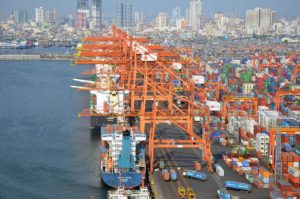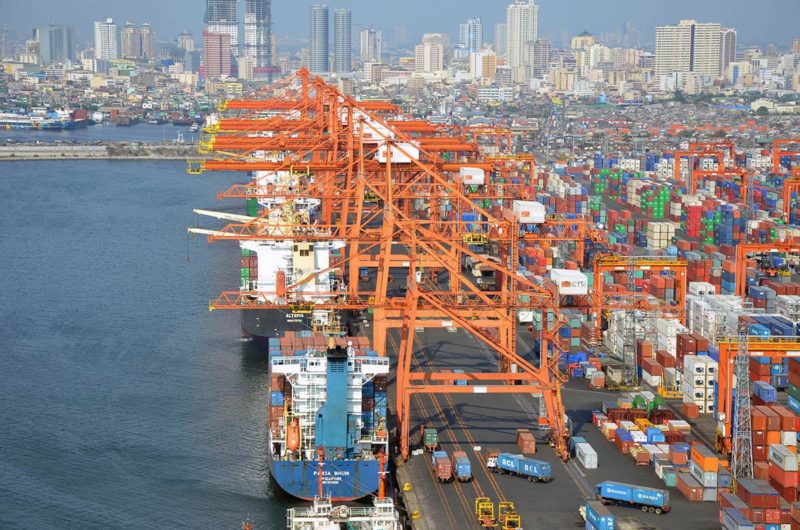
Global port operator International Container Terminal Services, Inc. (ICTSI) posted a net income of US$45.054 million in the first quarter of 2016, a decline of 20.7% from $56.802 million earned in the same period in 2015.
Revenue likewise dropped to $266.5 million, 10% lower than the $296.1 million reported year-on-year.
In a disclosure to the Philippine Stock Exchange, the port operator said the decline in earnings was mainly driven by lower storage and ancillary revenues, unfavorable container volume mix, lower capitalized borrowing cost, higher depreciation and amortization expenses, and start-up costs for new terminals and projects.
It added that the decline was offset by tariff rate adjustments and new contracts with shipping lines and services at certain terminals, and the continuing ramp-up at ICTSI Iraq. Excluding the translation impact of local currency depreciation to the U.S. dollar—particularly the 36% depreciation of the Brazilian real, 21% depreciation of the Mexican peso, and 6% depreciation of the Philippine peso—consolidated gross revenues would have decreased by 6%, the company said.
In the first three months of the year, ICTSI handled a consolidated volume of 2.054 million twenty-foot equivalent units (TEUs), 4% more than the 1.983 million TEUs serviced in the same period in 2015.
The increase in volume, ICTSI noted, was mainly due to new shipping line customers acquired and new services offered at the company’s terminals in Guayaquil, Ecuador; Manzanillo, Mexico; and Karachi, Pakistan; as well as the continuing ramp-up at ICTSI Iraq; and improved trade activities at the company’s terminals in Jakarta, Indonesia, and most Philippine ports.
Volumes from Asia operations, comprising terminals in the Philippines, China, Indonesia, and Pakistan, grew 5.8% to 1.063 million TEUs from 1.005 million TEUs, mainly due to new shipping lines and services at Pakistan International Container Terminal and higher trade activities at most of the Philippine terminals and in Jakarta.
The Asia operations accounted for 51.7% of the consolidated volume for the first quarter of the year, up from the 50.7% share in the same period in 2015.
Operations in the Americas comprised 35.7% of the total, lower than the 36.9% share last year.
ICTSI said volume from the Americas segment, composed of terminals in Brazil, Ecuador, Honduras, Mexico, and the U.S., increased marginally by 0.1% to 732,537 TEUs in the first quarter of 2016 from 731,971 TEUs in the same period in 2015.
This slight rise arose from new shipping lines and services at Contecon Guayaquil SA and Contecon Manzanillo, S.A. de C.V. However, the growth was tempered by lower imports at Tecon Suape, SA owing to the weak Brazilian economy and significant depreciation of the Brazilian real against the U.S. dollar. Volume expansion was also undermined by the discontinued vessel calls of two major shipping lines, Hanjin Shipping Co. and Hapag-Lloyd, at ICTSI Oregon in March 2015 due to the continuing effect of labor disruptions and conflicts.
Meanwhile, Europe, Middle East, and Africa (EMEA) operations, consisting of terminals in Poland, Georgia, Madagascar, and Croatia, reported a 5.1% growth to 258,382 TEUs from 245,887 TEUs in 2015, primarily due to continuous growth at ICTSI Iraq.
This was partially offset by reduced vessel calls and trade volume at Baltic Container Terminal. The EMEA operations accounted for 12.6% of the group’s consolidated volume in the first quarter of 2016, up from a 12.4% share in the same period in 2015.
The group is currently involved in 30 terminal concessions and port development projects in 20 countries worldwide.
For 2015, ICTSI reported a 64% decline in net income to $69 million, down from $192 million in 2014, while posting a 5% increase in cargo volumes handled.
For 2016, the group’s capital expenditure budget is about $420 million, mainly allocated for initial developments at new container terminals in Congo and Iraq, and for the continuing development of the project in Australia.





